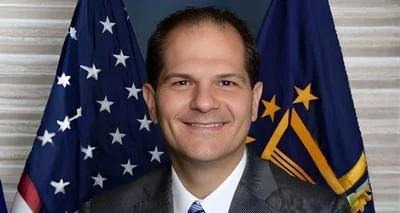Cook County Land Bank Authority ribbon-cutting on the 200th home rehabbed by the Land Bank. | Cook County Land Bank Authority
Cook County Land Bank Authority ribbon-cutting on the 200th home rehabbed by the Land Bank. | Cook County Land Bank Authority
On May 24, the Illinois legislature passed a "reform" bill that would give the controversial Cook County Land Bank Authority a near monopoly on buying extremely tax delinquent properties through so-called, salvage sales.
On June 6, a Sun-Times editorial publicly urged the governor to take swift action by signing the bill into law to benefit the Land Bank, which obtains most of its properties through salvage sales.

Ten days later, on June 16, the Land Bank quietly posted months-old summary of a damning operational assessment that found lack of oversight, transparency and ethical controls in the agency during the time period a former employee was able to run a scheme to profit from buying, rehabbing and Land Bank-controlled properties despite rules banning employees from doing so.
The Land Bank board in December 2022 was briefed on the operational assessment findings. The board asked for a written report that was completed March 16, but was held from the public until June 16, when it was posted on the Land Bank website without fanfare, public notice or news release.
Chicago City Wire discovered the report summary online last week.
On June 22, the legislation, Senate Bill 1675 was formally sent to Gov. J.B. Pritzker and is now awaiting his signature, which the Sun-Times
The Land Bank was formed by the Cook County Board in 2013 to "address the large inventory of vacant residential, industrial and commercial property. Cook County President Toni Preckwinkle appoints a 17-member board of directors to govern what is billed as the "largest land bank by geography in the country."
The Land Bank operates "independently" to accomplish its mission: "to acquire, hold, and transfer interest in real property throughout Cook County to: promote redevelopment and reuse of vacant, abandoned, foreclosed or tax-delinquent properties; support targeted efforts to stabilize neighborhoods; stimulate residential, commercial and industrial development- all in ways that are consistent with goals and priorities established by local government partners and other community stakeholders."
A decade later, the Land Bank has come under federal investigation and heavy scrutiny from investigative reporters.
The Cook County Land Bank Authority retained Riley Safer Holmes & Cancila (RSHC) on June 13, 2022 — about a month before a federal subpoena exposed that the Cook County Land Bank Authority hired a lawyer who was exposed as living with the top aide to Cook County Commissioner Bridget Gainer, the Sun-Times reported.
RSHC reported being hired to "conduct an internal operational assessment for the purpose of providing legal advice about the Land Bank's core operational functions," the summary document stated.
The firm was told to evaluate:
- How the Land Bank acquires properties.
- How the Land Bank disposes of properties
- How the Land Bank manages its assets
- the governance of the Land Bank
- the Land Bank's compliance culture.
The law firm was not retained to conduct a forensic audit of the Land Bank's books of records or to analyze individual property transitions. "Nor was RSHC retained to investigate any specific allegations of misconduct. Rather, our mandate was to assess each of the core operational functions of the Land Bank for legal and reputational risk."
What the law firm found, in short, was that Land Bank had operated without its own in-house legal council.
The Land Bank, which is managed by Preckwinkle appointed director Jessica Caffrey, also lacked processes for formally documenting the purchase, maintenance and sale of tax-delinquent property.
The Land Bank also did not provide the public adequate access to public information regarding the authority's core functions, including how it acquires salvaged properties, the report states.
RSHC's operations assessment found that nearly all the Land Banks properties are acquired through scavenge sales, the process for claiming a tax-deliquent property that is the main topic of a bill that awaits Gov. JB Pritzker's signature.
The RSHC report was presented to the Land Bank board on Dec. 1, 2022 — two days after federal prosecutors charged a former employee with profiting from a sophisticated crime involving Land Bank properties.
Mustafaa Saleh was charged and pleaded guilty to committing one count of wire fraud associated with a scheme to recruit people to pose as independent buyers to purchase six Land Bank properties on his behalf. Saleh later pleaded guilty to a scheme that lasted five years.
The initial criminal investigation alleged properties were purchased, redeveloped and sold again by people Saleh recruited.
The charges alleged Saleh had straw buyers pay him the proceeds from sales. Saleh also lied to the FBI, claiming he never collected the proceeds of a sale of any land bank property.
Saleh admitted doing all of it despite the ban on Land Bank employees having a financial interest in companies contracting with the agency.
A Department of Justice spokesperson said the Land Bank cooperated with the investigation of what he called a "sophisticated crime." The agency, board members, executive directors and other staff were victims of this crime and never the subject or target of this investigation,” the spokesperson said according to WTTW.
Land Bank officials did not make any part of the RSHC report public until six months after the board received it.
This wasn't the first time and audit discovered problems with the Land Bank's operation.
In 2019, Preckwinkle ordered an audit of the Land Bank following a Sun-Times report on an insider dealing involving then-Alderwoman Carrie Austin's chief of staff.
In 2020, a 17-page summary report found that the Land Bank need to better document the acquisition of properties and create policies that determine who should be able to buy property from the land bank.
At the time, Preckwinkle told the Sun-Times, "I am confident that the land bank will put procedures in place to quickly address the audit’s findings and recommendations.”
Two years later, the RSHC assessment of the Land Bank operation assessment found the authority has made some improvements, but continues to lack sufficient structure for accomplishing its mission, appropriate oversight and transparency in the public interest.







 Alerts Sign-up
Alerts Sign-up